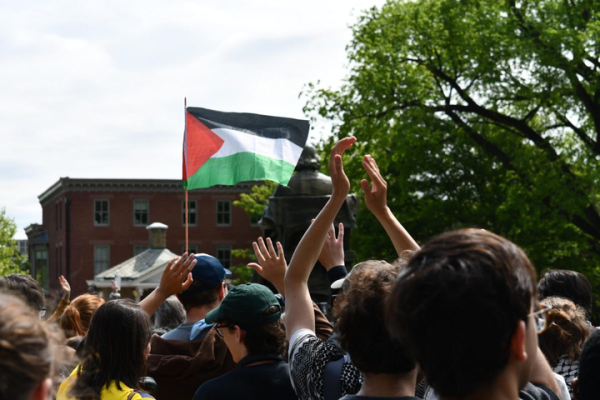Georgetown University students will face a referendum later this month on university divestment from companies and academic institutions engaged with Israel’s government.
Sixteen of the 28 members of the Georgetown University Student Association (GUSA) voted without public attribution — a departure from standard GUSA procedures — in favor of a resolution to put the divestment question before the undergraduate student body April 14 to 16. The referendum will require at least 25% turnout and a simple majority of voters in favor to pass.
The referendum, which will have no binding effect on university policy, asks voters whether they support the university divesting from its investments in companies with ties to Israel’s government. Georgetown holds investments in companies including Google’s holding company Alphabet and Amazon, both of which have provided technology to the Israeli military.
“I support Georgetown University disclosing all private investments to its community members and upholding its Socially Responsible Investment Policy, through divesting from companies arming Israel and ending university partnerships with Israeli institutions,” the referendum will read.
The measure also includes provisions to urge Georgetown to sever its academic ties with Israeli universities.
GUSA President Ethan Henshaw (CAS ’26), who co-sponsored the resolution, said the referendum will hold importance for students, even though its passage was unusual.

“It was clear to us that a large portion of the student body wanted the opportunity to vote on this and voice their opinion, and we felt it was important to give them the option, even if it meant passing it when the senate did,” Henshaw wrote to The Hoya. “Many of those in the senate were open to passing it and allowing students to make their voices heard on the issue, even if they may not be voting yes themselves, and I appreciate that. Personally, I am glad that this passed and I will be voting to support it.”
Vice Speaker Meriam Ahmad (SFS ’26), who introduced the motion, said the referendum allows students to voice their opinion on Georgetown’s investment practices.
“We worked to introduce this referendum because we believe that this is an important issue that students should have the opportunity to voice their opinions on,” Ahmad wrote to The Hoya. “In doing so, we leave it up to the student body to make their voices heard on this issue.”
Senator Sienna Lipton (CAS ’27), who introduced the motion alongside Ahmad, said pro-Palestinian students brought the idea of a referendum to GUSA senators as a means of allowing the student body to voice their opinions.
“It’s important for us as GUSA senators to be facilitators of both club organizations, but also what the students want,” Lipton told The Hoya.
“We just wanted to give the students an opportunity to voice their opinion on something relevant to them also because it has to do with where our tuition money is going, which I feel like is probably relevant to most students,” Lipton added.
During the meeting, senators voted to break GUSA rules to advance the referendum without the approval of the senate’s Policy and Advocacy Committee (PAC), which determines whether to send legislation before the full senate.
Senator Saahil Rao (SFS ’27) said he voted against the motion in part because its introduction was secretive and rushed.
“I voted no on the bill because I thought it should’ve gone through the process of PAC,” Rao told The Hoya. “There’s obviously a lot of controversial language within this referendum, and I thought we should have debated as a senate on how to present this issue to the student body in the most objective way possible.”
“It’s really quite unfortunate that we were not able to have those discussions,” Rao added.
GUSA senators expressed concerns that students supporting the referendum would face consequences, including deportation, amid the Trump administration’s crackdown on pro-Palestinian rhetoric and activism.
Henshaw said the bill’s introduction was delayed because he and other GUSA leaders had worked to gather information before submitting the bill to the senate.
“We wanted to spend time discussing with members of the faculty and the administration to ensure that there were no safety risks posed to the students or the university,” Henshaw wrote. “We also wanted to take time to get as much information from the university as possible, and had to delay introducing it as they delayed us.”
Senator John DiPierri (SFS ’25), who also voted against approving the referendum, said the motion was not introduced through proper channels.
“Every single rule related to our procedure was broken,” DiPierri told The Hoya. “It was not introduced at a PAC meeting. It was not given the sufficient amount of time between introduction and referendum. It was done very poorly.”
DiPierri said the motion signifies an overreach by GUSA on issues the student body lacks a clear consensus on.
“This is a very political topic,” DiPierri said. “There are people on both sides of this that have strong opinions. My opinions don’t matter in this. We should not be weighing in on political issues. I don’t know why our student government wants to pick a fight, but it’s not a fight that I want to be a part of.”